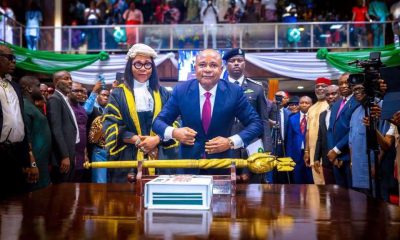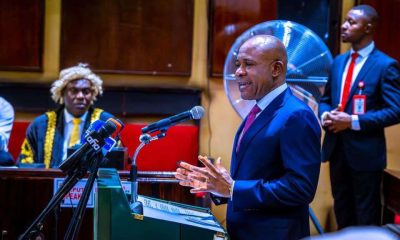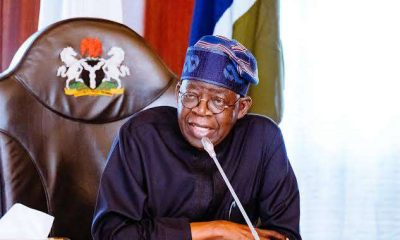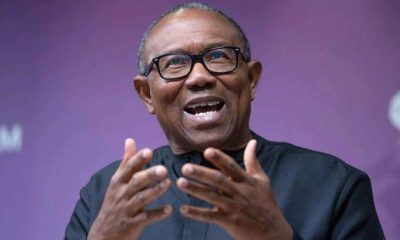Interview
Enugu is using transport as catalyst for economic development – Ugonabo

Iphie Ugonabo, Special Assistant to the Enugu State Governor on Transport, in this interview with Business Hallmark’s Obinna Ezugwu, discusses the Peter Mbah administration’s transformational agenda in the transport sector. She outlines key achievements in the past two years, and shares insights into the vision for the future.
Excerpts:
Enugu State is executing major transport infrastructure projects — bus terminals, Enugu Air, and now a proposed rail line. What’s the overarching goal?
The core objective of His Excellency, Governor Peter Mbah’s administration in the transport and logistics sector, is to use it as a catalyst for economic growth. That’s why we’re looking beyond just traffic management, which is also important and not being neglected. But transport is a key enabler of development. The first impression any visitor gets of a city often comes from its transport system — the roads, parks, and general traffic flow. If it’s chaotic, the perception is that the place is disorganized.
So, His Excellency is being very intentional. Growing an economy in today’s world requires doing things differently. That’s why you’re seeing these bold projects. When we came on board, we asked: how can we digitize processes to make things more seamless, especially payments and services to stakeholders? Also, how do we deliver world-class traffic management with our current capacity? Because, again, first impressions matter.
We are building a model transport system. Previously, it was mostly road transport, which remains important. His Excellency has rolled out massive road projects through the Ministry of Works to ensure quality roads in both urban and rural areas so that no community is left behind. But beyond roads, we needed supporting infrastructure, which led to the bus terminal projects.
We are set to commission five ultra-modern terminals this May. Two are at Holy Ghost: Terminal 1 for interstate travel, and Terminal 2 for intracity movement, including our BRT and other city buses. The Holy Ghost terminal is our flagship. It sits on about 13 hectares and is designed to handle high traffic volumes, hence the attention to detail.
We also have terminals in Nsukka (already completed), Gariki (about 98% done), and Abakpa, which is in a similar state.
The idea is to bring order and efficiency to the transport system. Take the Ogbete axis, for instance, which had long been marked by chaos, insecurity, and the persistent presence of hoodlums. Given that over 40% of the metro transit routes terminate at Holy Ghost, His Excellency took the bold decision to intervene decisively and, trusting the Ministry of Transport under the leadership of the Honourable Commissioner, Dr. Obi Ozor, to drive the execution of that process.
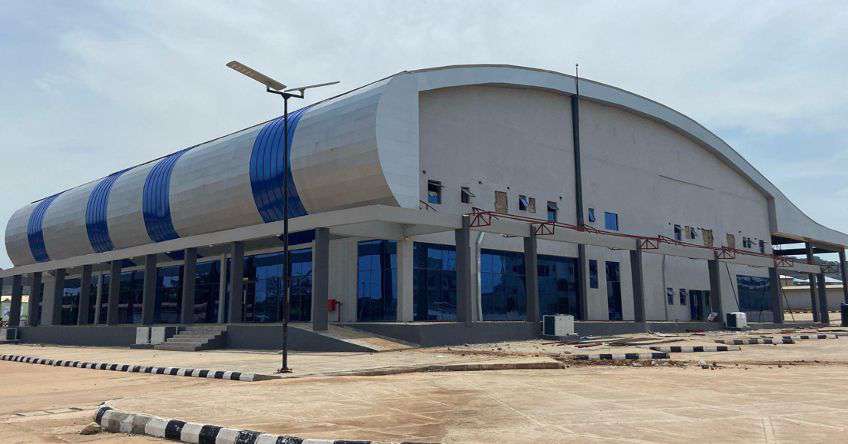
Ogbete Bus Terminal 1
His Excellency has envisioned a world-class interchange that doesn’t just function as a passenger transfer/loading point but one that promotes efficiency in transport operations, safety & order, improves urban mobility, integrates a smart Infrastructure and serves as an economic activity hub.

Ugonabo
Hence, the inclusion of retail outlets, banks, restaurants, cinemas, and motels. The idea is that if travellers arrive at night, they can rest, eat, and even shop — all in one secure space. It’s a one-stop hub for transport and ancillary services. We’ve also incorporated CNG filling stations since our buses run on compressed natural gas.
We’re building modern bus shelters and lay-backs across the state as part of our effort to bring structure back to our public transport system. A lot of the traffic disorder and safety issues we see on our roads stem from buses stopping randomly to pick up passengers. By creating designated stopping points, we are improving commuter safety and also easing congestion. Lay-backs ensure that buses can pull over without blocking active lanes, which helps maintain traffic flow.
His Excellency is also complementing this with better road markings and junction upgrades to create a more efficient and organized urban transport experience.
The aviation sector holds immense untapped potential, and few states have taken the bold step of launching their airline. For Enugu, however, Enugu Air is a deliberate part of a broader, long-term strategy to reposition the state as a hub for regional growth. The ongoing concession of the Akanu Ibiam International Airport reflects this vision. Recognizing that the government is not best suited to manage commercial enterprises, the state is championing private sector involvement to unlock the airport’s full potential.
After over a decade of stagnation, the international terminal project is finally gaining momentum, thanks to support from the current federal administration. As the political capital of the Southeast, Enugu shares a deep emotional and strategic connection to the airport. In addition to completing the international terminal, the development of a new cargo terminal is part of the deal, which would significantly benefit the region’s highly entrepreneurial population.
With much of their goods currently routed through Lagos, a functional cargo hub in Enugu would bring trade closer to home, boost economic activity, and create a more efficient logistics ecosystem for Southeastern businesses.
There is a huge demand for flights into Enugu, which are often overbooked. Travellers sometimes need two or three days’ notice just to get a seat. With our rapid development, and His Excellency’s investments in education, healthcare, and infrastructure, we need easier access for businesspeople and partners coming in and out of the state.
We are starting the airline with three Embraer aircraft for domestic routes, covering what we call the Golden Triangle … Lagos, Abuja, and Enugu… and other cities like Port Harcourt, Kano, Owerri, and Benin. Phase two will expand across Africa, especially Francophone countries, where our people do much business. Phase three targets Asia, particularly China, and the West. Enugu’s location on the equator offers strategic flight advantages, enabling direct routes to destinations like Guangzhou.
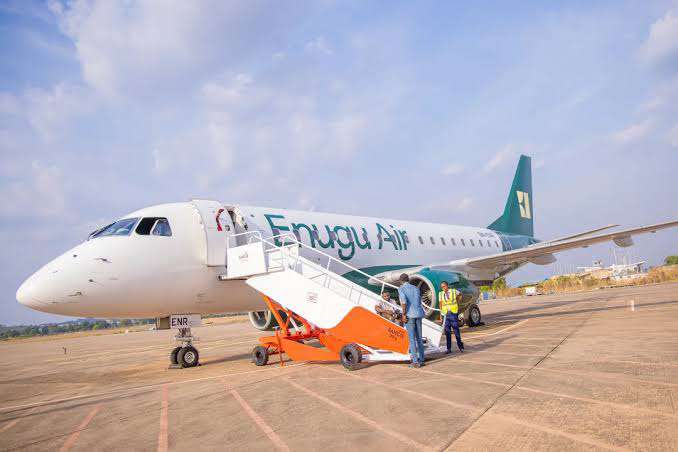
Enugu Air
Aviation supports tourism, hospitality, local crafts, and culture. For instance, the state recently approved about N13 billion to develop tourism assets — caves, waterfalls, and heritage sites. Governor Mbah’s manifesto promises to position Enugu among the top three states for tourism and business. A thriving transport system is foundational to achieving that goal. All these developments also create jobs and knowledge transfer opportunities. Our people are gaining exposure, acquiring skills, and exporting talent.
Yes, the rail project is the most significant piece in our multimodal transport vision. It holds major strategic value, especially in connecting the Southeast to Onne Port, which will help decongest Lagos. While the Nigerian Railway Corporation is currently constructing a narrow-gauge line from Port Harcourt to Maiduguri that will pass through Enugu and is currently in Abia.
Enugu State is developing its own standard-gauge rail corridor. This line will link the state to the North and the South through the port, enabling the efficient movement of agricultural produce, minerals, cargo, and even cultural goods. We have already completed feasibility studies and mapped connections to Anambra, Benue, Ebonyi, and other bordering states.
Phase one is about 135km. In the second phase, other states will build their links. President Tinubu visited earlier this year and promised to support the initiative. It’s a Southeast-wide project, but Enugu is taking the lead. We have secured interest from both local and international partners. What’s next is financing; once that’s done, we’ll move into execution.
For Gov. Mbah, transport isn’t just about movement – it’s about driving growth, creating jobs, enabling trade, and positioning Enugu as a regional hub for business and tourism.
There is a lot to unpack. You spoke about concessioning the airport. Many people have raised concerns about plans to concession it for up to 80 years and the perceived lack of transparency. But talking about Enugu Air, are you looking at private investors to drive the process?
Yes, definitely. We have clear plans for managing it. Like I mentioned earlier, the state government is providing the enabling environment and also the initial funding. We actually bought the aircraft outright; they are not leased. Enugu State (Enugu Air) owns the fleet.
We have an airline operation and management agreement with Xejet, an airline company that will operate the fleet on our behalf. Part of their role is to manage operations professionally while also helping us build capacity. We’re creating a local team that they will train and mentor. That way, by the time the partnership ends, we’ll have developed the expertise needed to run the airline.
It is not the ministry running the airline operation.. Our role is supervisory. We have oversight through the board, which includes experienced professionals and people, who have run, or are currently running airlines. Their job is to ensure governance structures are in place, that operations are world-class, and that the airline consistently meets the rigorous aviation regulatory and compliance requirements.
For now, we are riding on Xejet’s AOC (Air Operator Certificate) while processing ours. It’s a highly regulated sector, so these things take time. But His Excellency has been clear that we must follow the process thoroughly; dot every “i” and cross every “t” to get it right.
In the meantime, Xejet will run the fleet professionally. As we grow, we plan to expand the fleet. We currently have three aircraft, but more will come. Of course, these things are expensive, so we’re scaling gradually.
What’s important is that we’re showing serious commitment. We’re not just talking — we’ve invested real resources to demonstrate that we’re serious about making it work.
What about sustainability? You mentioned developing a cargo airport. That’s something many states are trying to do, but some, like the one in Ebonyi, haven’t really taken off. What makes you think Enugu’s will succeed?
Enugu has a long history. It’s long been the political and administrative capital of the Southeast. Our sister states are doing remarkably well, and I respect how far Ebonyi has come. But Enugu’s location and historical importance give us a natural advantage. Still, it’s not a competition. The more the merrier. If it works in Enugu and also works in Ebonyi or anywhere else in the Southeast, then it’s a win for the entire region – and for Nigeria as a whole.
What gives Enugu a unique edge is that we already have an international airport. Now, we’re developing a rail line that connects major economic corridors, including ports. That’s a central infrastructure backbone for supporting cargo movement.
The federal government owns the airport, and it’s being concessioned to private sector operators with global experience in managing airports. These are technical partners, who know the business and have proven track records.
Enugu State’s role is to provide the enabling environment and advocate for the region’s interests. We’re not the concessionaire. The federal government cannot concession the airport to a state government. What’s happening is a private sector-led process, and our involvement is mainly to support and promote it because it aligns with our broader economic goals.
When the issue of concessioning came up, there was controversy about the duration. The Minister later clarified that the process was ongoing and the reports were inaccurate. What’s the current situation?
From our end, the official position is the one released by the Honourable Minister of Aviation, Festus Keyamo. As I said, the state is not the concessioning party, so we’re not directly involved in that process. We’re following it closely and supporting it where necessary, but the federal government is handling the transaction.
When the reports of an 80 or 90-year concession surfaced, there was understandable public concern. But the Minister clarified that nothing has been finalized, and the numbers being circulated were speculative and inaccurate.
It’s still very much a process. The federal government has conducted site visits, due diligence, and negotiations, and will soon reach a final decision. Until then, we defer to the Hon. Minister’s position.

Iphie Ugonabo
It’s important to note that airport infrastructure requires massive investment. Even a small extension of the runway costs a lot of money. Remember when the airport was abruptly shut down? The state had to step in and collaborate with FAAN to ensure quick repairs. So, the scale of investment needed is significant, and that’s likely one of the considerations in the concession discussions. We’re waiting for the outcome, and trust the federal government to make a decision that balances investor confidence with public interest.
And talking about how capital-intensive some of these projects are, Enugu isn’t exactly one of the top revenue-generating states. Yet you’re doing quite a lot. How are you pulling it off? Take the proposed rail link to Onne Port, for instance. Are private investors involved?
You’re absolutely right, these are huge projects that require massive capital investment. But we’re focused on the segment that falls within our state, and for that, we’re looking at a Public-Private Partnership (PPP) model. The structure we’re exploring is one where the private partners bring in about 85% of the required funding, and the state contributes 15%. They’ll recoup their investment over time. That’s the only realistic way to undertake projects of this scale without overburdening citizens or depending entirely on FAAC allocations.
Of course, as other states along the corridor activate their portions of the rail project, they’re likely to adopt similar models. But for us in Enugu, we believe this is an essential investment — one that sets the foundation for long-term development. It’s not easy, but someone has to lead. If we don’t do it now, we may never have another opportunity to create this kind of transformation.
Still on sustainability, I visited Holy Ghost recently and noticed that traders were already selling in front of the barricades that were meant to keep them off the roads. Doesn’t that defeat the purpose of the new transport infrastructure being built there?
Yes, you’re right — some traders are still operating there. The thing is, the bus terminal is not fully operational yet. Construction is nearly complete — we’re just finishing up some touches — so full enforcement hasn’t started.
Right now, we’re still feeling the pulse of the people. We understand there are social factors at play. But once the project is commissioned, there will be strict enforcement. The team managing the terminal will not allow that kind of activity because it defeats the entire purpose. The terminals are being designed to restore order, and that means no more roadside trading or illegal parking. Our traffic management teams are already doing regular enforcement, but once we launch fully, it will be total. The environment around the terminals will be clean, organized, and befitting of a modern city.
There’s a large mechanic village being developed around the Oji River along the Enugu-Onitsha road. Is your ministry overseeing that project?
I believe that particular project is under the Ministry of Trade and Commerce, not ours.
Let’s talk about displacement. With the CNG buses and terminals you’re introducing, what happens to the existing transport operators? Will they be absorbed into this new system?
Definitely. The whole multimodal transport value chain we’re building is designed to create jobs — tens of thousands of them. We’re targeting between 20,000 and 30,000 jobs in the broader ecosystem.
Let me give you an example. His Excellency is initiating an EV/CNG taxi youth empowerment program that will become more visible in the coming year. As part of our youth empowerment strategy, we’re looking at 2,000 new taxis, and that’s a major job creator.
So, the idea is not to eliminate the current transport operators. Instead, we want to upgrade them. If you’re driving a Keke, we’ll provide training and support to help you transition to driving a taxi, which will earn you significantly more. We’re not pushing anyone out. In fact, we’ve carried the unions and associations along from day one. They’ve been part of our planning, and they support the vision because they can see the bigger picture.
Of course, we can’t cover the entire state with the CNG buses. People sometimes forget that Enugu State is more than just the city center — we have 17 local governments, each with its own transport needs. Many of these operators will continue to function in the hinterlands and even within the terminals. We’ve made provisions for them. But again, the long-term goal is to empower and elevate everyone involved, not exclude them.
And what about road infrastructure? BRT systems typically require dedicated lanes. It doesn’t seem like Enugu has the road network to support this system right now?
Who says we don’t? We do have the roads — His Excellency, through the Ministry of Works and Infrastructure, & Projects Development and Implementation (PDI) unit is expanding and rehabilitating even more. In fact, we’ve already mapped out the BRT routes and designed specific stop points to ensure the buses don’t stop in the middle of the road.
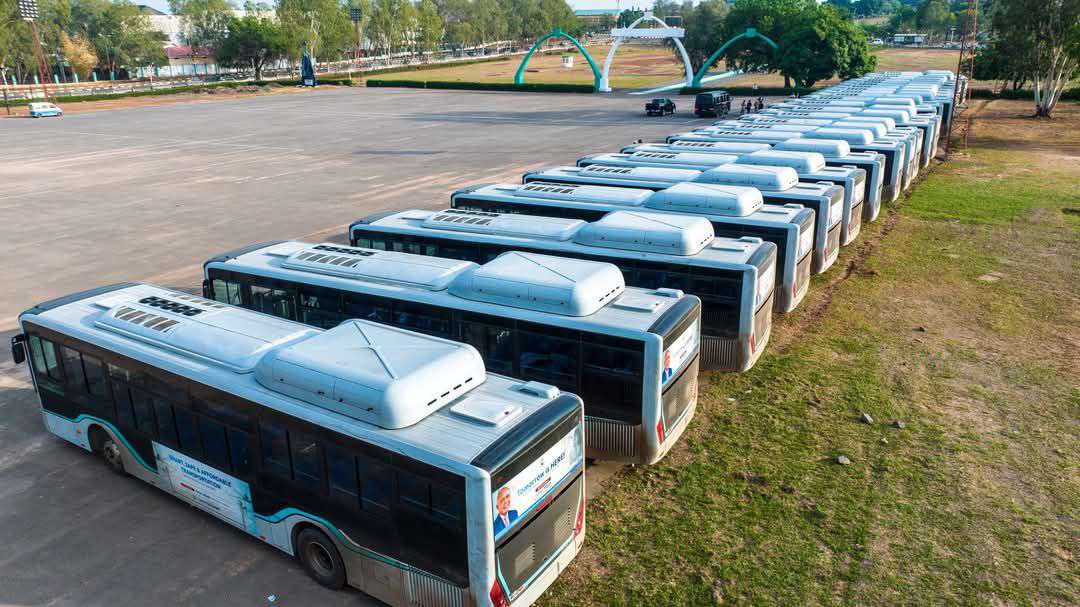
Enugu CNG buses
You’ve seen the buses at Okpara Square — massive, 10 to 12 meters long. These are not vehicles that can operate without proper planning. His Excellency understands this, which is why road infrastructure has been a top priority. Transportation is like the bloodstream of any economy — if you don’t get it right, nothing else works properly.
Our plan is to connect the terminals within the Enugu metropolis and extend service to areas like Nsukka and beyond. There will be designated stops and routes that make the entire system efficient and reliable. So, yes, we are very deliberate about getting this right, and the road network to support it is being developed accordingly.



